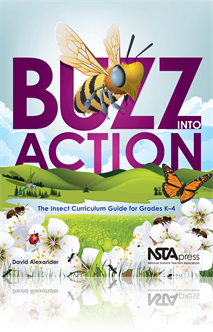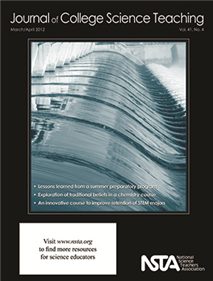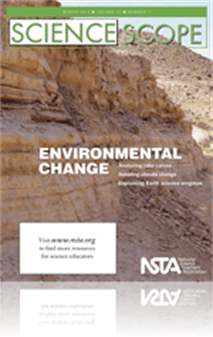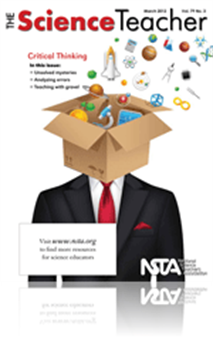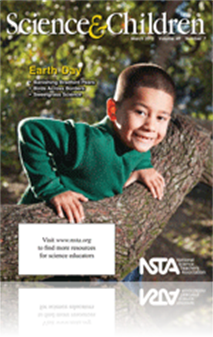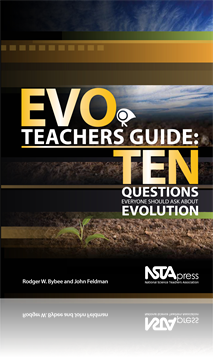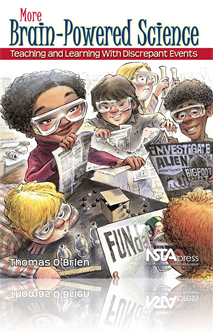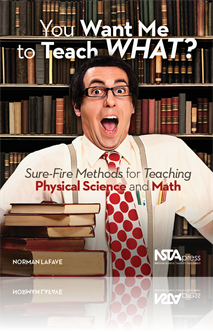All Resources
eBook
Buzz Into Action: The Insect Curriculum Guide for Grades K–4 (e-book)
Calling all aspiring entomologists, apiologists, and lepidopterists—as well as kids who just think bugs, bees, and butterflies are cool! ...
Journal Article
In this article the authors examine the nature of the instructional tools, strategies, and assessments they developed to convert a traditional senior-level biology course into a writing-intensive, capstone biology course....
Journal Article
Editor's Roundtable: A Tough Climate for Teachers
Science Scope’s editor shares thoughts regarding the current issue....
Journal Article
Why Did the Bald Eagle Almost Become Extinct?
The activity described in this article poses a question, provides evidence needed to answer the question, and uses a cooperative learning structure within which students analyze the evidence and create their own questions. Students see how a single c...
Journal Article
In this article the authors look in-depth at scientific practice number 2—developing, evaluating, and revising scientific models to explain and predict phenomena—and what it means for classroom teaching....
Journal Article
In this article the authors look in-depth at scientific practice number 2—developing, evaluating, and revising scientific models to explain and predict phenomena—and what it means for classroom teaching....
Journal Article
Natural Resources: The Naming Convention
This column helps bring the outdoors into your curriculum. This month’s issue talks about species identification....
Journal Article
Explaining Four Earth Science Enigmas With a New Hypothesis
Students learn group process skills and transferable ideas about how science works by researching and studying four enigmas....
Journal Article
Addressing STEM Retention Through a Scientific Thought and Methods Course
This article presents an innovative course, Scientific Thought and Methods, that targets students with low math placement scores. Course topics focus on development of scientific reasoning and the ability to engage effectively in all aspects of the s...
Journal Article
Role-play provides fifth-grade students with the opportunity to develop meaningful connections to environmental science concepts and understand how those concepts relate to their community....
Journal Article
Scope on Safety: Is Greener Cleaner?
This column shares safety information for your classroom. This month’s issue discusses cleaning the laboratory with green cleaners....
Journal Article
This project provies a unique opportunity for a partnership between two state colleges and two tribal Native American colleges. First, the authors developed a collection of interdisciplinary cases. Second they taught faculty how to teach with cases i...
Journal Article
Safer Science: Goodbye MSDS, Hello SDS
This column provides best safety practices for the science classroom and laboratory. This month’s issue discusses a proposed rule change to the Hazard Communication Standard, a national standard that addresses chemical management and employee safet...
Journal Article
Guest Editorial: The More High-Tech Our Schools Become, the More They Need Nature
An opinion piece about educational technology....
Journal Article
Students participate in an ecological pen pal exchange that focused on the broad differences in biodiversity between Scotland and America....
Journal Article
Teacher's Toolkit: Opening the Door to Science Instruction for All Through Literature
This column provides how-to strategies and practical advice for the science teacher. This month’s issue discusses using literature to engage students in science learning and build literacy....
Journal Article
The New Teacher's Toolbox: Lighting the Fire of Enthusiasm
This column shares tips for teachers just beginning their career. This month’s issue discusses the role that excitement plays in the classroom and provides tips to generate interest and enthusiasm when students need it most....
Journal Article
Traditional beliefs in the Mexican-American border region were compiled by students in an introductory general chemistry course. Some of these beliefs were used as the basis for short research studies and the results include the nature of traditional...
Journal Article
Point of View: Assessment and Natilie's Whirligig
This column shares reflections or thoughtful opinions on issues of broad interest to the community. This month’s issue discusses assessing critical thinking....
Journal Article
This article discusses teaching error analysis and other experimental skills in the physics classroom....
Journal Article
Outstanding Science Trade Books for Students K–12: Books Published in 2011
NSTA and the Children's Book Council identify the best science trade books of 2011....
Journal Article
Integrating the Arts: Teaching About Color Mixing With Light
This guided inquiry lesson is designed to help students develop conceptual understanding of the primary colors of light and differentiate between additive and subtractive color mixing....
eBook
E-BOOK ONLY EVO Teachers Guide: Ten Questions Everyone Should Ask About Evolution
Draw on the wit and wisdom of brilliant scientists to inspire your students as you teach them about a challenging area of biology. This teacher’s guide, which accompanies the EVO DVD, is structured around 10 fundamental questions about biological e...
Book Chapter
Medical Metaphor Mixer: Modeling Infectious Diseases
This model-building activity helps learners visualize SI’s base-ten relationships; the connections between the meter, liter, and gram; the real-world relevance of mathematics to science; and the somewhat abstract concept of powers of ten that is so...
Book Chapter
A teacher’s success in instructing teenagers is substantially enhanced the more the teacher understands teenagers. Between brain development, changing hormonal makeup, and environmental stimuli, there can be no doubt about what adults have known fo...
Book Chapter
Conquering Culture and Psychology
Students bring their own experience base to the classroom, and it may diverge greatly from that of the teacher. This makes it extremely important that teachers make an effort to understand the community in which they teach and the experiences student...
Book Chapter
Yes, Virginia, Study Habits and Learning Techniques Are Key!
Teachers like to point out in discussions pertaining to higher-order thinking that their students often struggle with lower-order thinking. Their point is well taken. There has been a trend away from making students memorize material. For example, th...
Book Chapter
From Concepts to Principles to Processes to Equations
There is a tendency for students to misunderstand order and priorities when learning advanced mathematics and physical science. Many times students become so focused on the equations that they fail to comprehend the concepts and principles that under...
Book Chapter
Doing Calculations the Right Way
Observing a student trying to solve a word problem can often be a frustrating experience for the teacher. The secret to getting students to learn processes is to set their perspective. They need to look at problems differently than their initial view...
Book Chapter
How to Analyze: Building the Perfect Laboratory Rat
Mastering analytical thinking is equally important to problem-solving proficiency for students’ enrichment and their preparation for professional careers. Analytical thinking is one of the top three categories in Bloom’s taxonomy, and mastery of ...
Book Chapter
OK, Now All My Students Will Love Science and Math, Right?
In math and science, maybe more than any other subjects, it is important that teachers be realistic and refrain from blaming themselves for all failures. This is counterproductive and takes time away from constructive efforts. This does not suggest t...
Book Chapter
But I Still Don't Feel Comfortable Teaching This
Many teachers will find themselves teaching upper-level subjects they do not feel adequately prepared to teach. In smaller schools, there may even be an inadequate staff to provide support to these teachers. With the shortage of science and mathemati...



